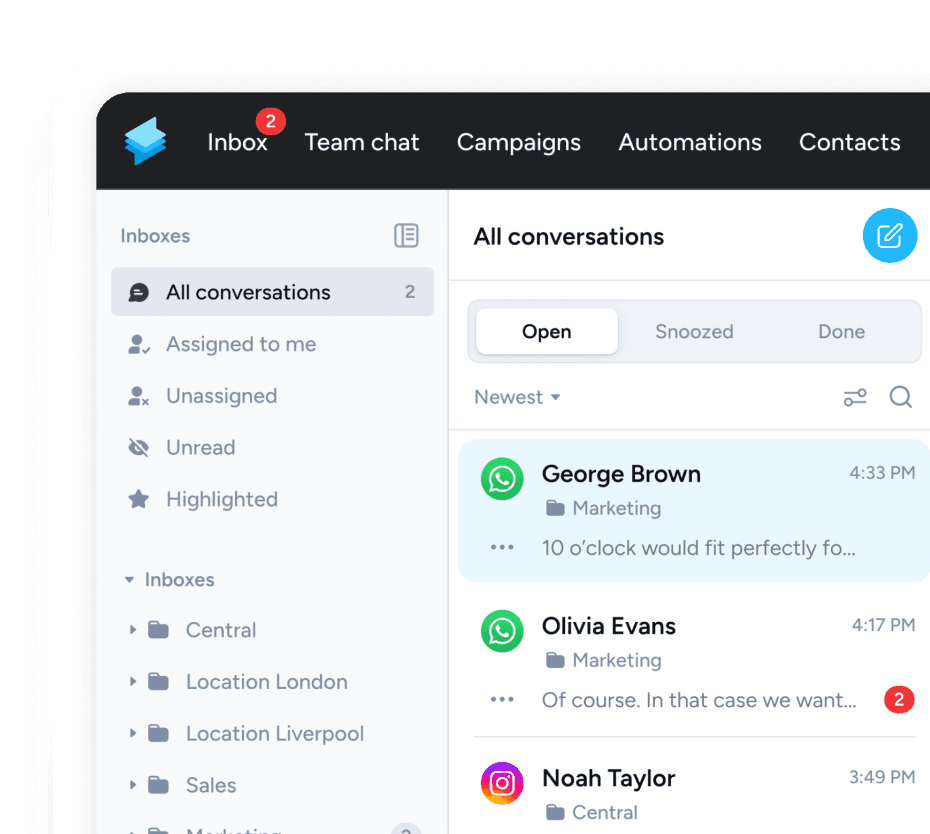According to a study by the consulting firm Simon-Kucher, 40% of all companies see the lack of qualified specialists as their biggest growth problem.
In recent years, demographic change has transformed the labour market into an employee market.
This poses a number of challenges:
- Candidates are becoming more demanding of companies and application processes.
- Companies need to fight harder for the attention of potential candidates
- Companies need to promote themselves and actively target talent. Job adverts no longer deliver the desired results.
WhatsApp and other messenger services can help recruiters and HR professionals meet these challenges. They offer the opportunity to create a simple application process that can be seamlessly integrated with other activities, such as social media campaigns.
Find out more about
- How to use WhatsApp for GDPR-compliant recruitment.
- How to map application processes in WhatsApp.
- How to use Messenger and social recruiting together.
- How other companies are successfully using WhatsApp for recruitment.


Recruiting via WhatsApp: How to stay data compliant
Recruit without personal data? Impossible. With or without WhatsApp, companies cannot avoid processing personal and sometimes sensitive data when recruiting new staff.
It makes no difference whether WhatsApp is used or not. Companies must therefore ensure that any tools they use to collect and process data comply with data protection laws.
WhatsApp Business can generally be used in compliance with data protection laws, such as the GDPR. This requires use through the WhatsApp Business API. Using the WhatsApp Business app may be problematic, as the app processes metadata that may conflict with data protection laws. This is the case with the GDPR, for example.
The API can be used to develop messaging platforms, which in turn are used by entrepreneurs like you. In this context, the privacy issue lies with the software developer. Not with Meta or WhatsApp. Superchat, for example, relies on servers located in Frankfurt, Germany. This means:
WhatsApp does not analyse metadata. There are no unencrypted backups. There is no access to contact details on your mobile phone. Your candidates' data is protected..
We have collected and summarized all the facts on how to stay data compliant using WhatsApp in one article. 👉 Can you use WhatsApp Business in a GDPR-compliant manner? - Here's how
Map and automate application processes in WhatsApp
Messengers like WhatsApp offer many benefits to businesses. These include the personal and fast interaction through conversations. Another advantage is the low barrier to entry, as candidates already use the apps on a daily basis.
The first step in recruiting with WhatsApp is to add a WhatsApp link or QR code to the messenger to the job advertisement. Pre-written messages can be saved in the chat window for candidates to send to the company.
This increases the likelihood that interested parties will become applicants. However, an efficient process can only be achieved if the workload for each application in the company is also reduced.
The number of applications is meaningless if they cannot be efficiently qualified and the recruiting and HR team cannot work effectively with the data.
You can use the WhatsApp API to fully automate your application process and integrate applications with your HR tools and processes. The data from your conversations can then be automatically transferred to the relevant systems and made available for the rest of the process.
Through automation, for example with [Superchat Automations] (https://www.superchat.com/product/automations), you can also personalise your recruiting conversations in Messenger. For example, you can send direct appointments to candidates for certain roles, while asking for additional documents or information for others.
You can also add 'quick replies' to your automated messages. These are suggested replies that can be sent to the recipient via the WhatsApp API and sent back as a reply with a simple click. This can further increase WhatsApp's already high response rate of over 20% and reduce 'ghosting' by candidates.
If you get opt-in from your candidates, you can build a talent pool via Superchat and notify suitable candidates of new opportunities via WhatsApp newsletters. This way you can fill positions much faster.
How to combine WhatsApp and social recruiting
Social media channels are increasingly being used for more than just customer marketing. For many companies, profiles on Facebook, Instagram, LinkedIn or TikTok are an important part of employer branding, or they even run their own channels for this purpose.
But social media platforms have a strong interest in keeping their users engaged. Some platforms, such as Instagram, do not allow links in normal posts at all. Others display content with external links, such as job adverts, less frequently.
Automated workflows in messengers or via direct messages can help you get around this. Users can simply start the application process with a specific message or keyword. This allows them to start the application process without leaving the platform.
For growing recruitment agencies such as Augusta Personaldienstleistungen GmbH, Superchat is the ideal tool for coordinating the use of WhatsApp Business across multiple locations in large teams.
Click to Messenger Ads!
Another exciting option is [Click to Messenger Ads] (https://www.superchat.de/blog/whatsapp-ads-click-to-chat-anzeigen) (also known as Click to Chat Ads). These are ads, usually on social networks such as Facebook, that take the user directly to a messenger rather than to a website or company profile.
The message that initiates the process can be stored directly in the link, so users only need to send the message.
Story links on Instagram follow the same line. Unlike posts in your feed, you can store links in Stories to direct followers to a quick application process on WhatsApp.
This works particularly well for blue collar jobs and for Generation Z or younger candidates.
The new Notes feature that Instagram is currently rolling out will work in a similar way. These are short notes of up to 60 characters that direct users to a profile's direct messages with a single click.
Another advantage is the international spread of social media platforms and messenger services. This makes it easier and cheaper for companies to find new employees abroad.


